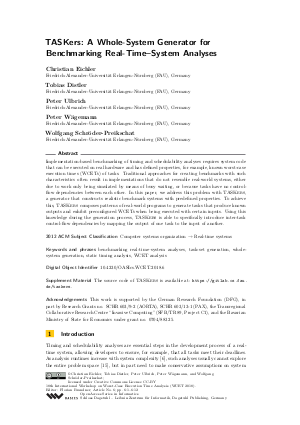TASKers: A Whole-System Generator for Benchmarking Real-Time-System Analyses
Authors Christian Eichler, Tobias Distler, Peter Ulbrich, Peter Wägemann, Wolfgang Schröder-Preikschat
-
Part of:
Volume:
18th International Workshop on Worst-Case Execution Time Analysis (WCET 2018)
Part of: Series: Open Access Series in Informatics (OASIcs)
Part of: Conference: Workshop on Worst-Case Execution Time Analysis (WCET) - License:
 Creative Commons Attribution 3.0 Unported license
Creative Commons Attribution 3.0 Unported license
- Publication Date: 2018-09-24
File

PDF
OASIcs.WCET.2018.6.pdf
- Filesize: 2.05 MB
- 12 pages
Document Identifiers
Subject Classification
ACM Subject Classification
- Computer systems organization → Real-time systems
Keywords
- benchmarking real-time-system analyses
- task-set generation
- whole-system generation
- static timing analysis
- WCET analysis
Metrics
- Access Statistics
-
Total Accesses (updated on a weekly basis)
0PDF Downloads0Metadata Views
Abstract
Implementation-based benchmarking of timing and schedulability analyses requires system code that can be executed on real hardware and has defined properties, for example, known worst-case execution times (WCETs) of tasks. Traditional approaches for creating benchmarks with such characteristics often result in implementations that do not resemble real-world systems, either due to work only being simulated by means of busy waiting, or because tasks have no control-flow dependencies between each other. In this paper, we address this problem with TASKers, a generator that constructs realistic benchmark systems with predefined properties. To achieve this, TASKers composes patterns of real-world programs to generate tasks that produce known outputs and exhibit preconfigured WCETs when being executed with certain inputs. Using this knowledge during the generation process, TASKers is able to specifically introduce inter-task control-flow dependencies by mapping the output of one task to the input of another.
Cite As Get BibTex
Christian Eichler, Tobias Distler, Peter Ulbrich, Peter Wägemann, and Wolfgang Schröder-Preikschat. TASKers: A Whole-System Generator for Benchmarking Real-Time-System Analyses. In 18th International Workshop on Worst-Case Execution Time Analysis (WCET 2018). Open Access Series in Informatics (OASIcs), Volume 63, pp. 6:1-6:12, Schloss Dagstuhl – Leibniz-Zentrum für Informatik (2018)
https://doi.org/10.4230/OASIcs.WCET.2018.6
BibTex
@InProceedings{eichler_et_al:OASIcs.WCET.2018.6,
author = {Eichler, Christian and Distler, Tobias and Ulbrich, Peter and W\"{a}gemann, Peter and Schr\"{o}der-Preikschat, Wolfgang},
title = {{TASKers: A Whole-System Generator for Benchmarking Real-Time-System Analyses}},
booktitle = {18th International Workshop on Worst-Case Execution Time Analysis (WCET 2018)},
pages = {6:1--6:12},
series = {Open Access Series in Informatics (OASIcs)},
ISBN = {978-3-95977-073-6},
ISSN = {2190-6807},
year = {2018},
volume = {63},
editor = {Brandner, Florian},
publisher = {Schloss Dagstuhl -- Leibniz-Zentrum f{\"u}r Informatik},
address = {Dagstuhl, Germany},
URL = {https://drops.dagstuhl.de/entities/document/10.4230/OASIcs.WCET.2018.6},
URN = {urn:nbn:de:0030-drops-97528},
doi = {10.4230/OASIcs.WCET.2018.6},
annote = {Keywords: benchmarking real-time-system analyses, task-set generation, whole-system generation, static timing analysis, WCET analysis}
}
Author Details
Supplementary Materials
- The source code of TASKers is available at: https://gitlab.cs.fau.de/taskers.
References
-
M. Bambagini, M. Marinoni, H. Aydin, and G. Buttazzo. Energy-aware scheduling for real-time systems: A survey. ACM TECS, 15(1), 2016.

-
E. Bini and G. Buttazzo. Measuring the performance of schedulability tests. Real-Time Systems, 30, 2005.

-
B. Blackham, Y. Shi, S. Chattopadhyay, A. Roychoudhury, and G. Heiser. Timing analysis of a protected operating system kernel. In Proc. of RTSS '11, 2011.

-
Y. De Bock, S. Altmeyer, J. Broeckhove, and P. Hellinckx. Task-set generator for schedulability analysis using the taclebench benchmark suite. In Proc. of EWiLi '16, 2016.

-
A. Burns and R. Davis. Mixed criticality systems - a review. Technical report, Department of Computer Science, University of York, 2018.

-
C. Dietrich, P. Wägemann, P. Ulbrich, and D. Lohmann. SysWCET: Whole-system response-time analysis for fixed-priority real-time systems. In Proc. of RTAS '17, 2017.

-
P. Emberson, R. Stafford, and R. I. Davis. Techniques for the synthesis of multiprocessor tasksets. In Proc. of WATERS '10, 2010.

-
H. Falk et al. TACLeBench: A benchmark collection to support worst-case execution time research. In Proc. of WCET '16, 2016.

-
J. Gustafsson, A. Betts, A. Ermedahl, and B. Lisper. The Mälardalen WCET benchmarks: Past, present and future. In Proc. of WCET '10, 2010.

-
M. Guthaus et al. MiBench: A free, commercially representative embedded benchmark suite. In Proc. of WWC '01, 2001.

-
M. Hoffmann, F. Lukas, C. Dietrich, and D. Lohmann. dOSEK: The design and implementation of a dependability-oriented static embedded kernel. In Proc. of RTAS '15, 2015.

-
B. Huber, D. Prokesch, and P. Puschner. Combined WCET analysis of bitcode and machine code using control-flow relation graphs. In Proc. of LCTES '13, 2013.

-
Infineon Technologies AG. XMC4500 reference manual, 2012.

-
F. Kluge, C. Rochange, and T. Ungerer. Emsbench: Benchmark and testbed for reactive real-time systems. Leibniz Trans. on Embedded Systems, 4(2), 2017.

-
J. Knoop, L. Kovács, and J. Zwirchmayr. WCET squeezing: On-demand feasibility refinement for proven precise WCET-bounds. In Proc. of RTNS '13, 2013.

-
S. Kramer, D. Ziegenbein, and A. Hamann. Real world automotive benchmarks for free. In Proc. of WATERS '15, 2015.

-
C. Lattner and V. Adve. LLVM: A compilation framework for lifelong program analysis &transformation. In Proc. of CGO '04, 2004.

-
M. Lv, N. Guan, Y. Zhang, Q. Deng, G. Yu, and J. Zhang. A survey of WCET analysis of real-time operating systems. In Proc. of ICESS '09, 2009.

-
F. Nemer, H. Cassé, P. Sainrat, J.-P. Bahsoun, and M. De Michiel. PapaBench: A free real-time benchmark. In Proc. of WCET '06, 2006.

-
OSEK/VDX Group. Operating system specification 2.2.3. Technical report, OSEK/VDX Group, February 2005.

-
Jan Reineke. Caches in WCET Analysis: Predictability, Competitiveness, Sensitivity. PhD thesis, Saarland University, 2008.

-
H. G. Rice. Classes of recursively enumerable sets and their decision problems. Trans. of the AMS, 1953.

-
P. Ulbrich, R. Kapitza, C. Harkort, R. Schmid, and W. Schröder-Preikschat. I4Copter: An adaptable and modular quadrotor platform. In Proc. of SAC '11, 2011.

-
P. Wägemann, T. Distler, C. Eichler, and W. Schröder-Preikschat. Benchmark generation for timing analysis. In Proc. of RTAS '17, 2017.

-
P. Wägemann, T. Distler, P. Raffeck, and W. Schröder-Preikschat. Towards code metrics for benchmarking timing analysis. In Proc. of RTSS WiP '16, 2016.

